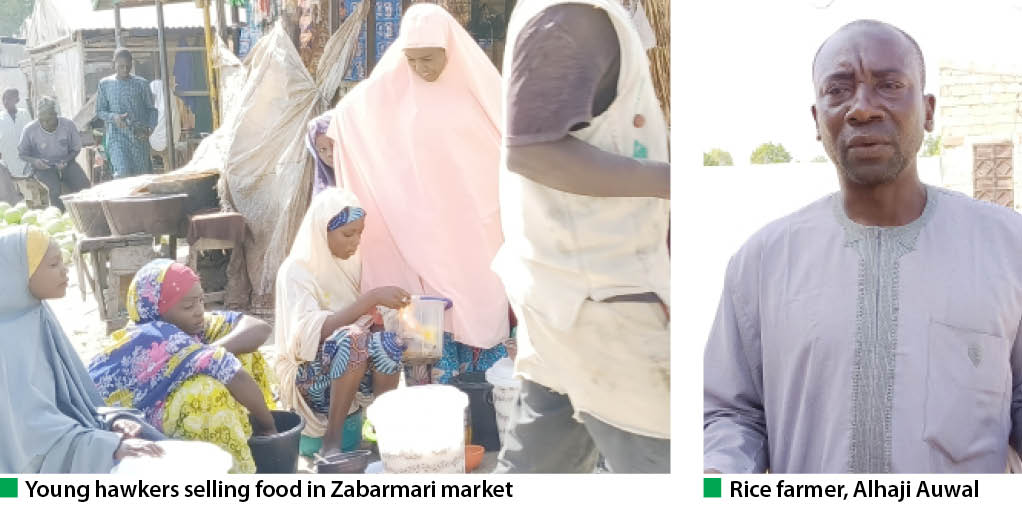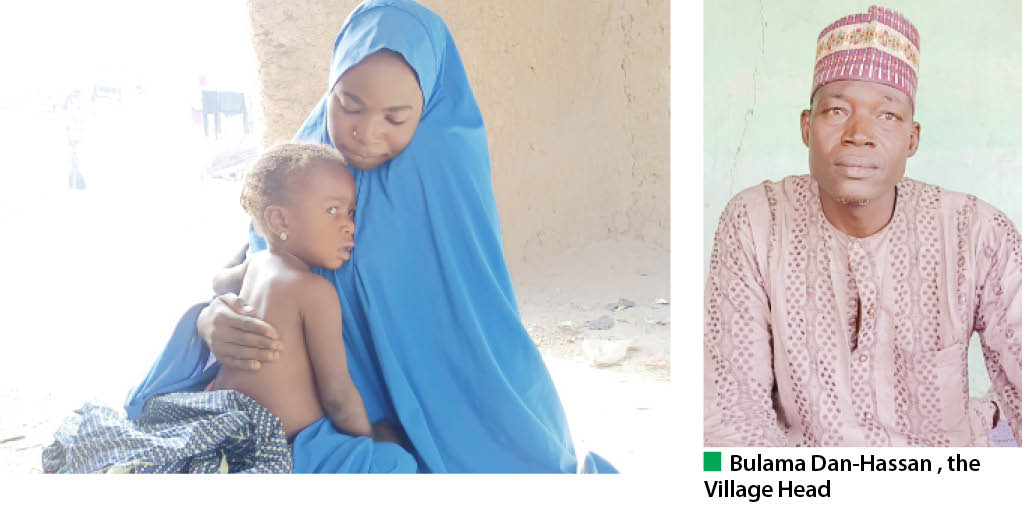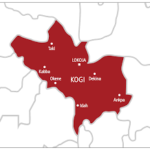Hajara Musa, 28, was married for three years before Boko Haram terrorists murdered her husband, leaving her with two children to cater for, including Hafsat, who is now two years old. Hafsat’s father and 42 others were brutally killed on a rice field on November 28, 2020.
Narrating her ordeal to Daily Trust on Sunday, Hajara said, “She (Hafsat) has been sick for over a week and I don’t have money to buy drugs or take her to the hospital.
“Her father married me as an orphan, so he was the only family I had. I don’t have siblings or anyone to help me; I am only looking up to God.
“I strive very hard to feed the children, with very little help from my uncle, who is equally poor. I cry each time I remember how my husband took good care of us. We never lacked anything when he was alive. It is unfortunate that I found myself in this situation.”
Hajara said she last heard from her husband a day before Boko Haram terrorists killed him.
2023: INEC On Edge As IPOB Intensifies Attacks In S/East
Smart phones, other devices, pushing us out of business – Clocksmiths
“He called around 9pm to inform me that he would return home the following morning. We had a lengthy conversation and he asked me to send him a recharge card to make some calls.
“As usual, I expected his call the following morning but he didn’t call and didn’t answer my several calls. I went to my uncle’s house to do henna design when my cousin came into the house crying. She told my aunt that they overheard people saying my husband and others were killed in the rice field. I couldn’t believe it until they recovered their corpses and buried,” she narrated amidst tears.
She appealed to the government to come to her aid and others in her shoes by giving them money to start businesses so that they would be able to feed their children and enroll them in school.
Another widow, Aisha, who was left with three kids, said life without her husband has been tough.
“Since that day, my life has never been the same. To eat has become difficult for us. Each time I look at these children they remind me of their father,” she lamented.
Aisha, who has, however, remarried said she had returned two of the children to her in-laws.
“But that has not brought any relief to me because I always think of them. Before my second marriage, I suffered a lot to overcome the trauma. Feeding and taking care of my children was a serious problem. I now leave everything to God.
“Sometimes, I am normal and happy, but whenever I remember my children and what happened to my late husband, I begin to cry,” she said, sobbing.
Residents, farmers still in fear
Lawan Musa, a relative to one of the farmers killed, said anybody who witnessed how the bodies of the late farmers were decapitated by their assailants would never have peace of mind.
“Almost all the bodies we recovered were slaughtered like animals. What surprised us was that we didn’t see much blood on the ground when we entered the place, so we began to suspect that the killing was for ritual purpose rather than retaliation as the terrorists claimed. That’s why I can never trust them no matter how repentant they claim to become,” he said.
Musa said his family adopted the children of the late farmer, while his wife relocated to Maiduguri recently.
‘Why we risk our lives to fish at Koshobe’
A brother to one of the killed farmers who simply gave his name as Jibrin told our correspondent that they used to sneak into the risky areas of Koshobe and its surrounding to fish despite warnings from community leaders.
He said they initially used to be scared each time they embarked on a journey to the bush, but with time they got used to it.
He said, “We have families to feed, and businesses in the town are becoming too congested, that is why we risk our lives to enter the bush for fishing and other activities.
“I just returned from Koshobe, where my brother was killed. We even saw some of the Boko Haram terrorists on the way.”
He said the insurgents were not as hostile as they used to be, adding, “Now, they only stop you to collect money or bread without any molestation.
“Unlike before, you will now see people arguing with the terrorists over what they would pay; and the boys will just collect what is offered to them at last.
“They will first stop your car, study you from a distance before they come. What I noticed was that the insurgents are now very much afraid of security men, especially the Civilian Joint Taskforce (CJTF).”
Daily Trust on Sunday noticed how Jibrin, along with six other passengers alighted from a vehicle in the market area.
He said, “Of course it is a dangerous area to visit, but we can’t stay here and die. We have no option but to take the risk.
“If you like, we can disguise you with turban and heavy cloths to visit Koshobe and other places we go for fishing.”
People still live in fear of another attack – Village head
One of the village heads in Zabarmari, Bulama Dan-Hassan, told Daily Trust on Sunday that indigenes of his community, which largely depends on rice farming and fishing, still live in fear.
“You will find a single house accommodating over 100 people, we live peacefully. In fact, the population here is bigger than the town itself,” he said.
Dan-Hassan said most of the farmers killed were young and energetic men who had many dependants.
“It was a very terrible incident that traumatised everyone in this village,” he said, adding that the attack has to some extent crippled rice farming and fishing activities the community is known for.
He said, “Before the attack, farmers would go as far as 100 kilometers to cultivate rice and fish; there was no limitation. But today, farmers are afraid to go beyond certain kilometers to avoid a repeat of what happened to our people because the boys (Boko Haram terrorists) are very much around in the bushes.
“As a result of this situation, many rice paddies are now left uncultivated and the fishes not harvested in the most potential places. Nothing in this world is worth your life. We saw the terrible thing that happened to our brothers last time.”
He also said that since the unfortunate incident, security operatives in the area had been up and doing to protect lives and property.
“But no matter how security agents try to provide cover for farmers in that location, it will not be possible because the whole place is waterlogged and terrorists are still there,” he added.
He said their town was overstretched as many communities that had deserted their homes in the northern part of the state had taken shelter there.
Many villagers from Karkut, Godda, Bulabulin 1, Godda Kizama, Bulabulin 2, Kayayya, Masu, Shuwari, Malongori. Kufceri, Koshabe and Balkari have abandoned their ancestral homes and relocated for fear of fresh attacks.
“Our farmlands have become overstretched because as brothers’ keepers we have to assist some of these displaced people with some portions to cultivate,” he said.
He commended the administration of Governor Babagana Umara Zulum for improving some infrastructures in the community.
“Before this administration came on board, we only had one primary school, with no health care facility, but the current governor built junior and senior secondary schools for us.
“Now, we want the federal government to build a health care centre for us. The governor is doing his best but he has too much at hand to address,” he said.
He expressed hope that with the way security agencies are fighting against the insurgents, things would get better soon.
We’re recording shortfall – Rice farmers
Rice farmers in the community said before the attack they produced majority of the local rice consumed in Borno and Yobe states, but since the incident happened, they have been recording a shortfall.

 Join Daily Trust WhatsApp Community For Quick Access To News and Happenings Around You.
Join Daily Trust WhatsApp Community For Quick Access To News and Happenings Around You.


